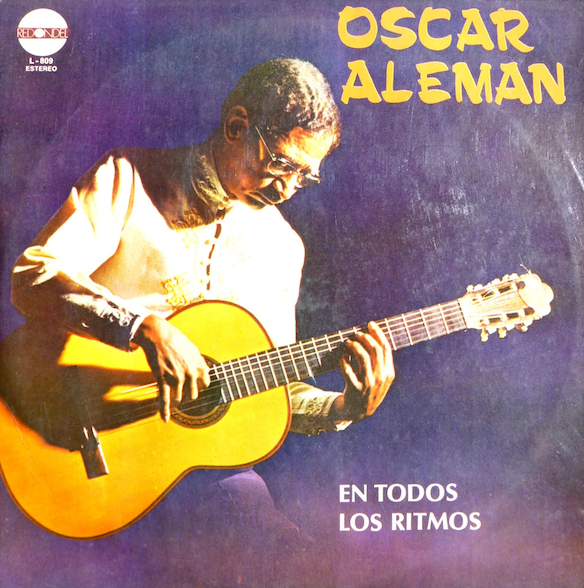Sunday, February 20, 2022
The Six String Swing of Oscar Alemán
“Aleman has more swing than any other guitarist on the continent.” Leonard Festher
"I knew Django Reinhardt well. He was my greatest friend in France. We played together many times, just for ourselves. I used to go to his wagon, where he lived. I've slept and eaten there—and also played! He had three or four guitars. Django never asked anyone to go to his wagon, but he made an exception with me. I appreciated him, and I believe the feeling was mutual." Oscar Alemán
Switching focus from silent films and vintage animation - frequent topics of this blog - to the world of music, today the spotlight is on Argentinian guitar virtuoso and entertainer Oscar Alemán, born on this day in 1909.
Have listened to and admired such terrific Alemán records as En Todos Los Ritmos, Alemán '72 and Grabaciones Recuperadas, as well as the Swing Guitar Masterpieces: 1938-1957 compilation mandolinist, bandleader and recording artist David Grisman curated for his Acoustic Disc label.
Still, was entirely unaware of the guitarist's dramatic roller coaster life and international presence in music until viewing Oscar Alemán, Vida Con Swing, a loving, detailed and archival footage-packed 2002 documentary written and directed by Hernán Gaffet.
A singer, dancer and actor as well as multi-instrumentalist, Oscar Marcelo Alemán (February 20, 1909 - October 14, 1980) was a one of a kind talent, born in Machagai, Chaco Province, in northern Argentina.
An entertainer, recording artist and teacher for five decades, Oscar experienced the loftiest of international stardom peaks and devastating no-work-whatsoever valleys. It is such a rich showbiz tale that we can only touch on a few points here, unless the objective is to not actually complete this blog post until February 20, 2023 or 2024.
Oscar's early life entailed so much adversity, grinding poverty and personal tragedy as to make Charlie Chaplin's childhood look like Sunday in the Park (with or without George). Both were child performers, Oscar already singing and dancing onstage with the family band, the Moreira Sextet, at the age of six. He was orphaned suddenly when his mother died and his father subsequently committed suicide. Oscar's siblings scattered and he would find himself homeless and living on the streets in Santos, São Paulo, Brazil. Supporting himself as a dancer, boxer and by playing the cavinhuelo (a four-stringed instrument) and guitar, he began to play music professionally in a duo with Brazilian guitarist Gaston Bueno Lobo. Oscar's first radio show appearance in 1926, rather amazingly, has been preserved
As Les Loups (Los Lobos), the duo played popular tunes in many genres, with Oscar frequently playing Hawaiian guitar, and recorded sides for Victor in 1927-1928, then, with the addition of violinist Elvino Vardaro, Trio Victor. Before he turned 20, Alemán was a prolific recording artist.
In the late 1920's and early 1930's, Oscar would become interested in playing American jazz after hearing the guitar-violin duo of Eddie Lang and Joe Venuti.
In 1931, he became the featured guitarist in Josephine Baker's touring ensemble. Soon, he would lead her band, the Baker Boys, at the Cafe de Paris. Duke Ellington saw Oscar play and was floored. When he asked Josephine if he could hire Oscar Alemán for the Duke Ellington Orchestra's next United States tour, she said no; to paraphrase her response, "where could I find someone who speaks nine languages, can dance, is black, plays guitar, cavaquinho, bass and drums - and is a good person?" Nonetheless, Oscar sat in as a special guest with the Duke Ellington Orchestra and performed with them for individual concerts in Europe.
Alemán later formed his own nine-piece band which would play nightly at the Le Chantilly, just across town from where Django Reinhardt and his partner violinist Stephane Grappelli would be performing at The Hot Club of France with their Quintet. Although these two innovative virtuosos of jazz guitar from outside the United States, unfortunately, never recorded together, they became close friends.
After the Nazis stormed into Paris, banning "degenerate" music and all art in favor of their preferred pastime of murdering people, Oscar relocated to Buenos Aires. Through the 1940's, he performed and waxed some of his best recordings with an excellent swing quintet, featuring jazz violinist Guillermo Oliva, and also performed with a nine-piece orchestra.
He enjoyed playing in Buenos Aires and turned down invitations from bandleaders such as Harry James to join their groups and travel to the United States.
Oscar Alemán appeared periodically in films (Trois Argentines a Montmartre, Buenos Aires Sings) and was quite the dynamic performer, as seen in the following clips. Among the few memorable scenes of the potboiler El idolo del Tango: Oscar's rousing performance as guitarist, dancer, singer and showman.
A comprehensive Oscar Alemán bio and discography by Norwegian jazz critic Jan Evensmo was posted on the excellent Jazz Archeology website. Lots and lots of related material on Oscar Alemán, including transcripts from television appearances and radio interviews, is up on YouTube, among quite a bit of excellent Argentinian jazz. Alemán's appearances on Buenos Aires television are numerous and soundtracks from them turn up on YouTube.
The guitar giant's music is still being played and celebrated. An Oscar Alemán Play-Along Songbook Volume 1 was published in 2019 and the Argentinian version of The Real Book concentrates heavily on the Alemán repertoire. For musicians, these are fitting addendums to Hernán Gaffet's film.
Must tip one of Oscar's stylish hats to the late Hans Koert, who devoted a blog to him and was a key link to guitar enthusiasts and Oscar fans worldwide.
In conclusion, it's good to know that Oscar's granddaughter, vocalist Jorgelina Alemán, is carrying on the family tradition in the 21st century and has organized tributes to him. Here she is, singing one of her grandfather's signature tunes, Hombre Mío.
Labels:
Django Reinhardt,
guitarists,
jazz,
music,
Oscar Alemán,
swing music
Subscribe to:
Post Comments (Atom)








No comments:
Post a Comment